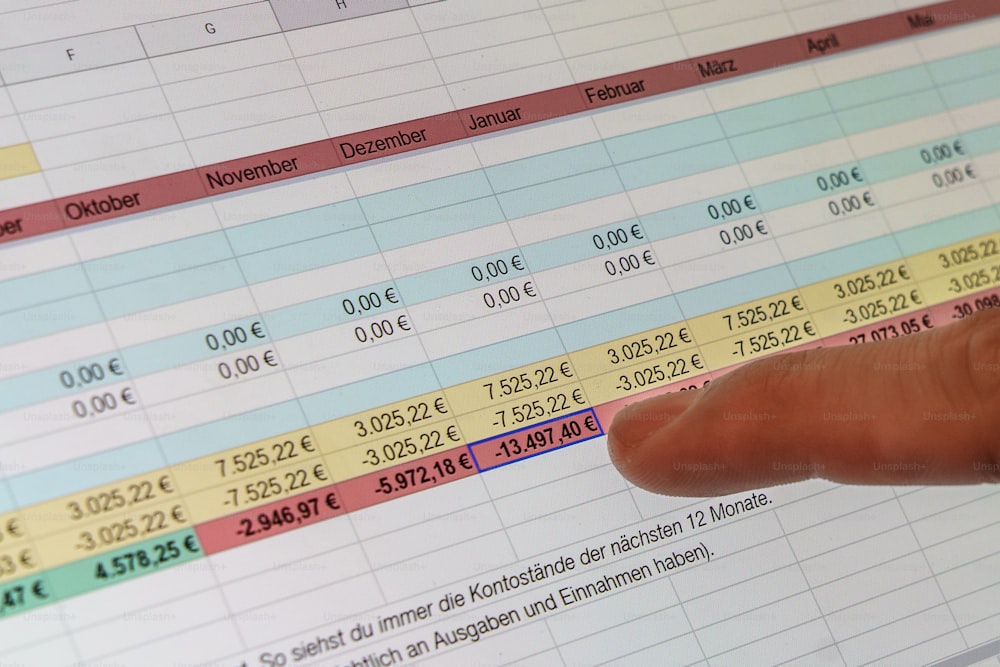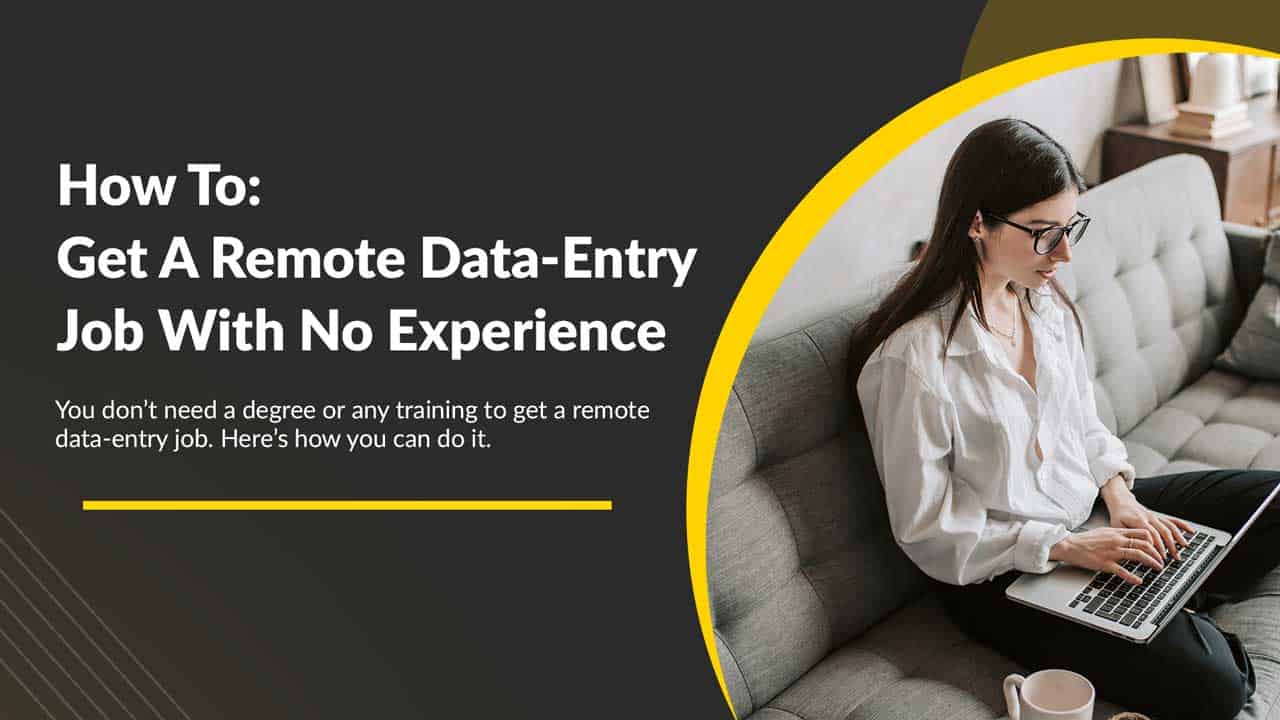Gone are the days where you’re locked-in to a boring cubicle in a dark office blasting stale air conditioning. We live in a day and age where you can work a remote job from home with little to no prior experience. That’s right – anyone can get a remote job now – you don’t have to be a super-experienced executive or even have a degree.
Whether you’re looking for a primary job that can be done at home, or you want something to supplement your current income, there are plenty of options. Arguably one of the most popular ones is remote data entry.
It’s an entry level job you can do with no previous experience, making it a great choice for anyone looking for their first remote work position, or for folks looking for at-home jobs they can do when they’re not at work. So, if you’re looking for at-home data entry jobs, no experience required, here’s how to prepare best and how to find one as quickly as possible.
What Are Data Entry Jobs?
Data entry is a clerical job title, which is why the actual position is sometimes referred to as a “data entry clerk”. The job is very simple — all you need to do is use various processes, such as typing or voice recording, to add, edit or verify all kinds of data. And when I say all kinds of data, I really mean it — data entry can have you do anything from searching for addresses and organizing them in a spreadsheet, to formatting postal codes and adding payroll information. Attention to detail is key.

There are plenty of companies offering remote data entry work because they need to transcribe meeting notes, add and organize raw data into databases, and other similar tasks that need to be done in a timely manner, by someone that may or may not have prior experience.
As a data entry clerk, your day-to-day duties may include research on various topics to find the necessary information and data, as well as reading through and organizing company files in an easily accessible manner for the employees. You’ll be asked to comply with data integrity and security policies which vary on a per-job basis, and sometimes you may need to write reports on your findings.
The Advantages of Remote Jobs
Whether you’re looking at a remote data entry job, or any other remote job, there are a lot of advantages when compared to a regular 9 to 5 position. As long as you remain responsible and complete all tasks that are given to you, there are plenty of benefits, such as a flexible work schedule, the ability to do other duties around the house while working, the freedom of being able to take a lunch break whenever you need it, and of course, the comfort of being in your own home instead of in an office.
Seriously, I’m writing this very article in my underwear right now. You can’t do that at an office!
Being able to work on your own schedule is what gets a lot of people hooked on working remote jobs. You no longer have to organize your life around your working hours. Instead, you can organize your working hours around your life. You want to grab an early lunch? Only want to work for an hour or two instead of eight today? You got it – as long as you get the job done.
You’ll also save a lot of time. There’s nothing worse than wasting time every day when you already work eight hours! If you live in a small city, this may not be too big of a deal, but in larger cities, the time you save commuting can easily add up to a couple of hours per day. Those are a couple of hours you can spend doing something more productive (like reading this blog!), rather than stuck in bumper-to-bumper traffic on your way home. Believe me, once you experience the comfort of working from home, you won’t want to go back to an office.

A remote data entry position is either paid by the hour, or on a per-task basis. If you get paid by the hour, most employers will let you set your own working hours, and you’ll get paid as much as you get done. If, however, you prefer getting paid on a per-task basis, you can pick and choose when and how much you work – as long as you get everything done and to a satisfactory standard.
How Much Can You Make From Data Entry Jobs?
As with any other job, the pay for a data entry clerk varies quite a bit, depending on a few factors – including, unfortunately, the experience required. On the flip side, even the entry-level data entry jobs will pay quite a bit above minimum wage. This makes it great for people looking for low or no experience jobs, such as remote data entry.
When you’re starting out, you can expect anywhere from $12 to $18 per hour, if you find an entry level job position that pays by the hour. This is a range for people that have no prior experience, but the range still varies depending on your skills – I’ll get to that in a minute.
When you have a bit of experience, you can expect to be paid between $15 and $25 per hour, again, depending on the job complexity and how good you are. To circle back, if you’re looking for a no-prior-experience data entry position, there are a few things that you can do in order to find a job easier, and get paid better.
How To Get A Remote Data Entry Job With No Experience
In saying you can get a remote data entry job with no experience, I truly mean that there are positions with no experience required. Data entry is a job that you can learn very quickly, and you don’t need to be tech savvy or have a particular skill set. That’s not to say it won’t help, but it’s far from crucial.

With that being said, there are several things that you can do to be better prepared for working as a remote data entry clerk, and to make your entry level job a bit easier for you. First things first – getting the job.
Work On Your Communication Skills
When you don’t have the experience required for a position, and you don’t really have a portfolio to show, the thing you’ll need to sell to a potential employer is yourself. The key thing from my experience is to be open about the things you do know, but also the things you don’t know.
When applying for an entry level position, employers expect that you won’t know everything. Many of them will be willing to provide training resources that will help you improve your ability to do the job better, but if you say you know everything, they probably won’t do that.
Working on your communication skills will make you more approachable, which plenty of employers tend to appreciate, sometimes more than the experience needed to do a job. If a potential employer finds that you’re easy to work with, open to feedback and suggestions, and willing to learn the ropes regarding the position, the experience required takes a back seat.
Learn To Use an Office Suite
One of the main tools, if not the main tool you will need to work as a data entry clerk is an office suite. There are plenty of them out there, from Microsoft Office, to Google Docs, OpenOffice and Libre Office. Some are completely free, some are only free up to a certain degree, and some are paid and not at all affordable.
Why is this important? Well, because even if you have zero experience working as a data entry clerk, any entry level position will either require you to know your way around an office suite, or be prepared to learn it quickly so you can do your job. If you already do know how to use an office suite, you’re already ahead of other applicants, increasing your chances of getting the job.
Which Office Suite is Best?
As far as the absolute best office suite goes, that honor usually goes to Microsoft Office. However, Microsoft doesn’t offer it for free, and you’ll either need to buy a license, which is incredibly expensive, or subscribe to Microsoft 365, which is also expensive to get all the nice features. If might be something to consider once you’ve got a steady income, but not when you’re starting out.

My suggestion would be to spend some time working with Google Docs. It’s the gold standard for free office suites, it has everything you might need from a functional perspective, and it has collaboration tools that make it a breeze for remote teams to work together. I would also suggest you spend the most time on Google Sheets, which is a spreadsheet software that’s key if you want to input and organize data, i.e. work as a data entry clerk.
Improve Your Writing Skills
The other thing that’s important from a technical perspective, aside from an office suite, is the ability to write. Even though most data entry jobs will have you inputting and organizing raw data, some will also require you to write reports based on your research. Those reports need to be well-written, organized, and accessible to anyone that needs to read them.
If you want to be able to write well, practice is key. Find topics that interest you and start writing — you’ll improve over time. Now, you may be wondering what writing on random topics has to do with doing reports as part of data entry jobs.
The thing is, having good writing skills means that you can easily analyze your target reader, in this case your client or employer, depending on the relationship, and write things in a way that they’re easy for them to understand. It will also help you improve your typing speed, which is always a plus.
I do feel like I have to mention that your writing skills probably won’t be the thing that lands you the job. However, if you’re on par with another applicant that doesn’t have good writing skills, yours will be appreciated.
Start Looking for a Job!
Now that we’ve got all the prep work out of the way, it’s time to actually find a no-experience data entry job. Today’s market is admittedly competitive, but if you’re looking for an entry level position and have what it takes to work as a data entry clerk, you shouldn’t have too much trouble.
I would like to mention that when I was looking for my first no experience remote job, it took me two months of searching before I had interviews lined up. However, not only did I not have any experience, but I was also terribly bad at communicating what I can and can’t do, and I didn’t have any of the skills required for the position.
My point is, don’t give up if you can’t find a data entry job straight away. It might take some time before you get there, and the key is to be persistent in your search.
Where Can You Find A No-Experience Data Entry Job?
In most cases, freelancing platforms such as Upwork and Freelancer would be my first recommendation for anyone looking for an entry level, no-experience data entry job. However, things have changed drastically in the past couple of years, and those platforms are no longer what they used to be. There are far too many low quality job postings and scams, making these platforms a bad idea for someone starting out.

Instead, you can turn to regular job posting sites, such as Indeed and Glassdoor. Both offer data entry jobs, both part time and full time, and you can filter by jobs that don’t require any experience. The pay and benefits will vary on a per-job basis, but you can also filter by that if you want to.
To add to this, there is another platform that’s all about business — LinkedIn. You can create a profile, add your previous work experience (even if it’s not related to data entry), and use it as a work portfolio. LinkedIn’s job search is great, with things like a latest job alert, emails whenever there is something new, and an overall easy-to-use UI that makes finding a job a breeze.
Another great thing about LinkedIn is the fact that there are plenty of recruiters that actively seek out new people, so if your profile indicates you’re looking for a data entry position, it will show up on the recruiters’ radar.
Wrapping Up
When all is said and done, getting a data entry job even if you have no prior experience in the industry isn’t that difficult. Yes, it will take a bit of time initially, but you can increase your chances by expanding your skill set and setting up a job alert on popular job finding websites.
FAQ
How Hard Is Data Entry Work?
Working as a data entry clerk is not hard. It does require attention to detail and being able to provide consistency in often repetitive tasks, but aside from that, it’s a rather easy and straightforward job.
What Skills Are Needed for a Data Entry Job?
The most important skills for a data entry position are to be able to handle electronic files and organize them, have a solid understanding of an office suite, and to be able to write well, and write fast.
Is Data Entry Still In Demand?
Yes, very much so. It’s one of those at-home positions that you can do on the internet with minimal training resources, and as the economy continues to improve, this kind of position will always be available and in demand.





